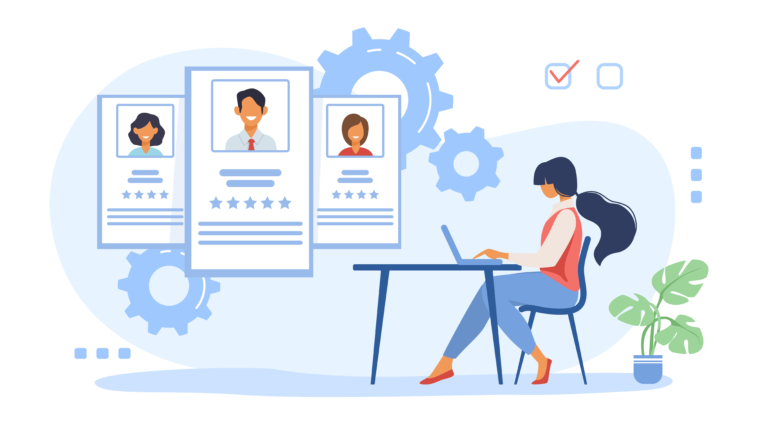In today’s fast-paced and highly competitive job market, the process of recruiting has evolved dramatically. The traditional methods of sorting through stacks of resumes and conducting extensive interviews have become increasingly inefficient and time-consuming. Fortunately, the advent of artificial intelligence (AI) has ushered in a new era of recruitment, making the entire process smarter, more streamlined, and efficient. AI for recruiting is indeed a game changer, and in this article, we will delve into how it is transforming the landscape of modern recruitment.
1. Harnessing the Power of AI for Recruiting
AI for recruiting, also known as AI-powered hiring, involves the use of advanced algorithms and machine learning to automate and enhance various aspects of the recruitment process. From sifting through resumes to assessing candidate suitability and even conducting initial interviews, AI has proven to be a valuable tool for HR professionals and hiring managers. By harnessing the power of AI, organizations can significantly reduce the time and effort required to find the right talent.
2. Resume Screening with Precision
One of the most time-consuming tasks in recruitment is the initial screening of resumes. In the past, HR teams had to manually review numerous resumes to identify potential candidates. AI for recruiting automates this process by analyzing resumes and extracting relevant information. Keywords like “AI for recruiting” are used to filter through resumes efficiently. This not only speeds up the process but also ensures a more precise selection of candidates.
3. Enhanced Candidate Matching
AI algorithms are designed to analyze job descriptions and candidate profiles to identify the best matches. By considering a multitude of factors, including skills, experience, and cultural fit, AI can suggest top candidates for a specific role. This targeted approach to candidate matching not only saves time but also increases the chances of finding the right fit for the job.
4. Personalized Candidate Engagement
AI for recruiting extends beyond the initial screening phase. Automated chatbots and email campaigns powered by AI can engage with candidates, providing information about the company, the hiring process, and even answering frequently asked questions. This personalized engagement ensures that candidates have a positive experience, even if they are not ultimately selected for the position.
5. Reducing Bias in Hiring
Unconscious bias can be a significant issue in traditional recruitment processes. AI for recruiting helps minimize bias by focusing on objective criteria such as skills and qualifications. By removing human subjectivity, AI ensures that candidates are evaluated fairly and solely on their merit, contributing to a more diverse and inclusive workforce.
6. Streamlined Interview Process
AI-driven interview platforms have the capability to conduct initial interviews with candidates. These interviews are structured, consistent, and based on predefined criteria, making the process more objective. Candidates can answer questions at their own convenience, and AI can analyze their responses, allowing hiring managers to focus on the most promising candidates during later-stage interviews.
7. Continuous Learning and Improvement
AI is not a static tool; it constantly learns and improves. As it processes more data and interacts with candidates, it becomes better at identifying the most suitable candidates for specific roles. This iterative learning process ensures that AI for recruiting becomes more effective over time, benefiting organizations in the long run.
8. Redefining the Role of HR Professionals
AI for recruiting does not replace HR professionals but rather enhances their roles. It allows HR teams to focus on higher-value tasks such as building relationships with candidates, developing talent strategies, and fostering a positive company culture. By reducing administrative and repetitive tasks, AI frees HR professionals to be more strategic and innovative.
9. Adapting to Changing Market Conditions
The job market is dynamic, and the skill sets required for various roles can change rapidly. AI for recruiting can adapt to these changes by identifying emerging trends and helping organizations align their hiring strategies accordingly. This adaptability is essential in a world where skill demands are continually evolving.
10. Future of AI for Recruiting
The future of AI for recruiting is bright. With advancements in natural language processing, predictive analytics, and automation, AI is expected to play an even more significant role in recruitment. As the technology continues to evolve, it will offer even more sophisticated solutions for talent acquisition, making the hiring process even more efficient and effective.
In conclusion, AI for recruiting is a game changer for modern recruitment. Its ability to streamline the process, reduce bias, and enhance candidate engagement is transforming the way organizations find and hire talent. While AI takes care of the repetitive tasks, HR professionals can focus on building meaningful relationships with candidates and driving strategic talent initiatives. As the technology continues to improve and adapt, AI for recruiting is poised to shape the future of the job market and contribute to more efficient and effective hiring practices. Embracing AI for recruiting is not just a choice but a necessity for organizations looking to stay competitive in the modern job market.

